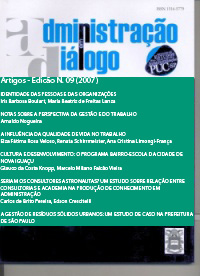CULTURA E DESENVOLVIMENTO: O PROGRAMA BAIRRO-ESCOLA DA CIDADE DE NOVA IGUAÇU
DOI:
https://doi.org/10.20946/rad.v9i1.1512Resumo
Resumo No Brasil alguns governos locais vêm assumindo o papel de protagonista do desenvolvimento por meio da elaboração de políticas públicas que têm como referência as especificidades socioeconômicas e culturais do território. Nesse trabalho analisamos de que maneira o programa Bairro-Escola, implementado pela prefeitura de Nova Iguaçu- RJ, contribui para o desenvolvimento dessa região. Realizou-se pesquisa bibliográfica e de campo e os dados foram analisados de forma interpretativa. Os resultados apontam que o Bairro-Escola contribui para o desenvolvimento em Nova Iguaçu ao gerar emprego e renda, promover inclusão sociocultural de jovens e crianças, formação humana, criação de equipamentos culturais, entre outras ações. Palavras-chave: Cultura, Desenvolvimento, Bairro-Escola. Abstract In Brazil, some local governments have been assuming an important role in promoting development, by means of elaboration of public policies which have as reference the socioeconomic and cultural specificities of the territory. In this work we analyze how the Neighborhood-School Program, implemented by Nova Iguaçu (RJ) local government, contributed to the development of this region. A bibliographical and field research was carried out and data was analyzed interpretively. The results point out that Neighborhood-School contributes to the development of New Iguaçu since it creates jobs and improves income, promotes sociocultural inclusion of youths and children, human formation, creation of cultural equipments, among other actions. Keywords: Culture, Development, Neighborhood-School.Métricas
Carregando Métricas ...
Downloads
Publicado
2008-11-19
Como Citar
Knopp, G. da C., & Vieira, M. M. F. (2008). CULTURA E DESENVOLVIMENTO: O PROGRAMA BAIRRO-ESCOLA DA CIDADE DE NOVA IGUAÇU. Revista Administração Em Diálogo - RAD, 9. https://doi.org/10.20946/rad.v9i1.1512
Edição
Seção
Artigos
Licença

Este obra está licenciado com uma Licença Creative Commons Atribuição 4.0 Internacional.







